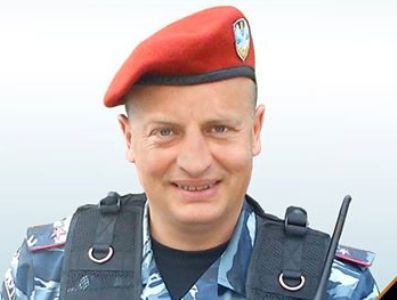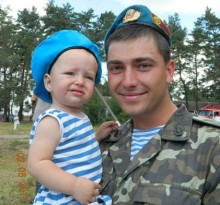The counter-terrorist operation in Donbas has claimed the lives of about 300 of our military. There is somebody’s life, destiny and history behind each figure in this sorrowful statistics. The Day continues publishing the stories of the Ukrainian heroes killed during the hostilities in eastern Ukraine. Today we are saying about heroes from the Lviv, Zhytomyr, and Sumy regions, who were honestly doing their duty and died as a result of the terrorists’ insidious actions. We must know them, and we will always remember them. Read previous stories on The Day’s website (www.day.kiev.ua).
“First of all, we must remain human”
Vitalii Bakhur from Zolochivshchyna died two weeks before his 25th birthday. He was killed together with 48 of his friends on the night of June 14 in the IL 76 downed by terrorists
Vitalii Bakhur, born in the village of Zozuli, Lviv oblast, served as an airborne officer in Hvardiiske, near Dnipropetrovsk. On the night of June 14, he and 48 of his mates were on board the IL 76, a Ukrainian Air Force transportation plane that was shot down as it was approaching the Luhansk airport. According to the Ministry of Defense, the aircraft was carrying relief personnel. All the men died.
Vitalii is survived by a little daughter, wife, mother, father (working abroad), and two younger brothers. A senior lieutenant, Vitalii died when he was two weeks short of 25.
He graduated from the Field Artillery Department of the Missiles and Artillery Faculty at the Lviv-based Hetman Petro Sahaidachny Land Forces Academy. The Day journalist visited the killed officer’s alma mater.
“I knew Vitalii from 2006,” says Course Supervisor, Senior Lieutenant Andrii KRICHFALUSHII, “We applied to the academy at the same time and studied in the same group.”
Andrii recalls that Vitalii was a good learner, an active participant in all the academy’s events, a healthy and fit fellow. “He was a normal rural person. He shared all he had with his mates. He was doing like everybody else – sometimes well, sometimes not so well, – but he had an ideal character. He never shunned other people’s problems – he helped as much as he could. If he was stronger in some academic subject, he would offer to help underachievers. If he was stronger in something else, he also helped. I am speaking not only about our group of 17-year-olds, but also about other junior and senior cadets.”
I can see that Andrii finds it difficult to speak… The officer’s eyes are tearing up. “I still can’t believe that this misfortune has happened… We shared the same barrack and bread for four years…”
“Vitalii was eager to become a paratrooper,” Andrii goes on. “He was glad to come to know of an opportunity to serve in the 25th Detached Airborne Brigade. We later met here, in Lviv, when Vitalii came from the Dnipropetrovsk region to see his parents. He said he was highly pleased with his service, especially after he had been appointed battery deputy commander in charge of airborne training. His entire life was before him.”
“I came to the academy in 2009,” says Lieutenant-Colonel Vadym YAKOVENKO, head of the Missiles and Artillery Department. “The group, in which Vitalii studied, was my debut. I spent almost a year with them. What can I say about Vitalii? He was… It’s difficult for me to speak about him in the past tense. For they, cadets, are all children for me. They all phoned me after graduation. I can remember Vitalii saying to me on the summer evening after the graduation party, when everybody was leaving: ‘Comrade Lieutenant-Colonel, it is perhaps not so important what heights we will reach. The main thing is that we should remain humans.’ I say it again: it’s difficult for me to say ‘was’ about Vitalii. He was always calm. While somebody could be nervous because he failed to do something, Vitalii was always even-tempered. He is like the air – when it is around, you don’t notice it, but when it is gone you get stifled. I will also say that Vitalii was firm of purpose: he wanted to become a paratrooper and he became one. But he had first become a professional artillerist. While learning to parachute, he stayed on as part of an artillery battery. He might have remained an artillerist deep in his heart for all his lifetime. It is very hard for me, the department head, to lose people. Very hard… When Vitalii died, a little part of me went off with him. It is said that God takes the best and all we have to do is remember them.”
The remains of Senior Lieutenant Bakhur, as well as those of his comrades-in-arms on board the plane, have not yet been identified. As the academy’s Deputy Commandant Colonel Yurii Husar told The Day, the academy will pay for the funeral of Vitalii Bakhur.
We will remember him eternally. God rest his soul.
By Tetiana KOZYRIEVA, The Day, Lviv
He was always positive-minded
Oleksandr Tkachenko saved hundreds of human lives but was blown up by a militants-laid mine

Photo from the website of Sumy Oblast Police Directorate
Sumy residents were paying their last respects to him on July 14. He had died in a conflict-ridden Donetsk region. As part of a Sumy oblast composite police unit, Major Oleksandr Tkachenko saved hundreds of human lives, but he died when an antitank mine laid by militants exploded.
He was treated like father or elder brother. Those who knew him are saying that he always cheered up his younger colleagues and was positive-minded. Warrant Officer Roman Rozhchenko, who was in the same vehicle with Tkachenko during the tragic event, says: Oleksandr had his feet torn off, but he did not notice this at first – perhaps due to a pain shock. He went on issuing commands to the personnel. The blast wave threw Roman out of the vehicle, which saved his life, while Oleksandr died in hospital.
On that day, a column of Ukrainian police vehicles went to the recently-liberated Siversk to enforce law and order. It was necessary to check administrative and residential building for explosives and render assistance to the affected local residents. The auto with the law-enforcers was blown up by an antitank mine which terrorists had laid just on the city’s central street.
“Oleksandr happened to be in the explosion’s epicenter,” says Viacheslav Dranovsky, commander of the Sumy oblast composite police unit. “He was promptly rushed to a hospital, but his wound proved to be fatal. Words cannot express all that we are feeling now. Tkachenko was, without an exaggeration, the life and soul of our unit. For the young servicemen, he was a mentor, an advisor, a father, and a friend. There were instances when fatigue, major physical and moral loads were exhausting people and literally knocking them down. He would always come up in such cases, find a word of consolation for everybody, and tell a joke to keep up the morale.”
According to the Sumy Oblast Police Directorate’s press service, Oleksandr used to say: “I have a son of the same age as they are. I can’t allow anything bad to happen to these children.” He was always the first where it was dangerous. His death in fact saved the lives of at least 30 of his comrades who drove behind him. For if the next vehicle had been blown up, there would have been a much heavier death toll.
There are dozens of spotted mines to Oleksandr’s credit and, accordingly, tens, if not hundreds, of saved human lives. It was a tragic irony that nothing but a mine caused his death.
“Oleksandr was also an extremely modest person. The leading mass media recently told the entire world that 150 civilians, whom the militants were going to use as a human shield, had been freed from the basement of Mykolaivka’s House of Culture. But the name of the hero who did it remained unannounced. It is our Sashko who found those people,” says Elvira Bihanova, spokesperson of the Sumy Oblast Police Directorate. “He was very considerate and responsive. Whenever a town or a village was liberated, the first thing Oleksandr did was begin to help local residents solve their problems. He helped people do their household chores and very often shared his ration with the hungry. He continuously received calls from the neighboring villagers. He was indifferent to fame and awards, but he cared about people.”
Oleksandr began to serve in the police as beat officer at the Sumy city detached patrol battalion 10 years ago. Then he was an operative in the crime detection and drug control squads. From May 2011 until February 2013, he was a documentation inspector at a Berkut riot police company and, later, inspector at the emergency call center of the Sumy oblast special-purpose police company.
Oleksandr Tkachenko was repeatedly decorated for a long and irreproachable service. He was awarded medals “For Irreproachable Service,” 3rd class; “For Valor and Gallantry in Crime Detection,” 2nd class; and “90 Years of the Crime Detection Service in Ukraine.”
Hundreds of Sumy residents came to pay their last respects to the hero policeman and morally support his wife and son. Tkachenko’s comrades-in-arms carried the coffin all the way to the Central Cemetery. He is said to have personally requested to bury him in uniform, for serving Ukraine was his vocation. He will always remain in our memory as a Man among men, a considerate comrade, and a caring mentor.
By Alla AKIMENKO, Sumy







